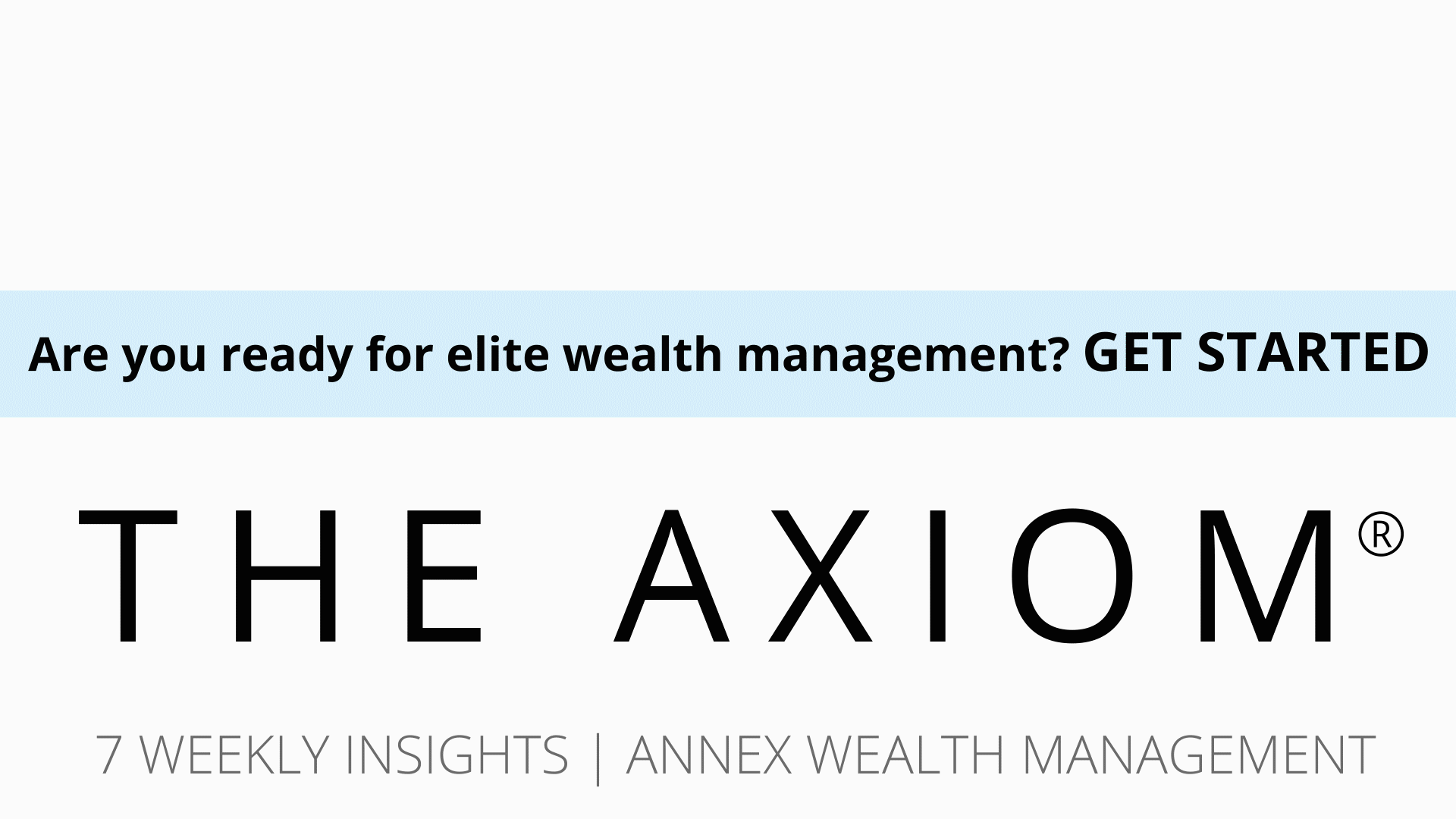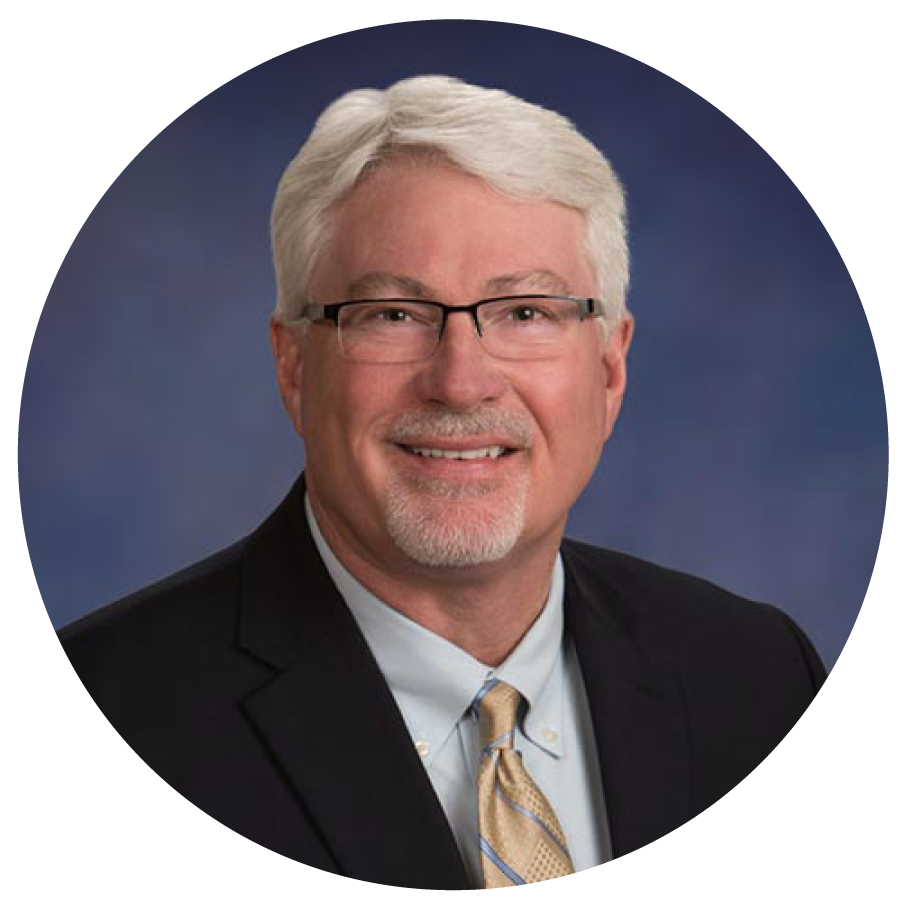
Axiom | Vol 244
FEATURED: Meet The Axiom’s Guest Editor: Denis Johnson | Inside: The Dow Closes Down As Markets Pay Attention To Interest Rates | Poll: Do You Have Enough Money Saved If You Are Planning On Retiring Early? | MoneyDo: Early Retirees: Consider How To Bridge The Health Insurance Gap | Ask Annex: Wouldn’t A $15.00 Minimum Wage Be Inflationary? | DYADT: Does Your Advisor Help You Prepare You And Your Children For College? | Why Gas Prices Are Rising | January Retail Blows Past Expectation | What’s That? What’s A Furlough

Meet The Axiom®’s Guest Editor: Denis Johnson
I’m Denis Johnson, a Wealth Manager with Annex Wealth Management, located in the Appleton office.
My wife Sarah works with me at the Appleton branch – and she has suggested that I don’t mention the actual number of years I’ve been working in the financial industry. Sarah says clients would be impressed if I just say 30 years (I trust her instincts). These years (and more) have helped me understand your current walk and future needs.
I’m happy Sarah has remained my beautiful, God fearing wife for 37 years. I’m the proud father of two adult kids, and happy to tell you all about my grandson. I was raised in a farming community, where people have respect for others, and value honesty, and a strong work ethic. I am very blessed to be able to work in an occupation I enjoy.
BACK TO TOP ↑

Dow Closes Down As Markets Pay Attention To Interest Rates
Interest rates have been poised to rise as the American economy rises post-health crisis. Investors may be looking beyond large cap growth stocks for answers. Annex Wealth Management’s Dave Spano and Derek Felske discuss.
BACK TO TOP ↑

Do You Have Enough Money Saved If You Are Planning On Retiring Early?
A recent study found that around 830,000 people are expected to retire early due to the recent COVID-19 pandemic, sudden job changes, and potential health risks. Some people saw the pandemic as the perfect time to retire early with the necessary funds and plans in place, while some were forced to retire due to sudden furloughs or unemployment.
BACK TO TOP ↑

Early Retirees: Consider How To Bridge The Health Insurance Gap
If you’re thinking of retiring early, then this week’s MoneyDo may help. It’s important to have a health insurance plan in place throughout your life, but some neglect considering their plan prior to retirement. As you consider various options, make sure coverage is in force the day after you retire and that have considered coverage options until you reach 65, when many are aware they can transition to Medicare.
Depending on your individual situation, there are several options available prior to Medicare eligibility:
Employer Options – Some employers provide retiree health benefits capable of covering you until Medicare eligibility. Check with your benefits administrator to find out if you have any options available.
COBRA – COBRA allows you to stay on your employer’s group health plan, but you pay 100% of the premiums, including a small administrative fee. COBRA can get very expensive, and it has a time limitation – it can last for 18 months after a qualifying event (such as termination or retirement).
Health Care Marketplace – Also known as the ‘exchange’ or “ Obamacare,” the health care marketplace is a way for individuals to shop for various health plans through a federally-operated platform. You can look at various options at HealthCare.gov, and depending on your income, you may qualify for tax credits to offset some of the premiums.
Stand-alone Plans – Many insurance carriers offer plans outside of the Healthcare Marketplace. Among the offerings are various types of plans, like catastrophic health plans, which have lower monthly premiums but have higher out-of-pocket annual deductibles.
Medical Cost Sharing Plan – Various organizations, like Medi-Share, offer alternative healthcare expense sharing options, which allow members to share in other’s medical expenses.
As you research and study alternatives, make sure you’re aware of what’s available and what works best, given your health care needs. Items to consider:
- Annual or monthly premium.
- Deductibles or other out-of-pocket expenses.
- Out-of-pocket annual maximums.
- Your current medications and coverage under a new plan.
- Will your current doctors fit into a new network?
Your Moneydo would be to ensure your research is complete and that you have selected a plan prior to retirement. If you need help, seek out a financial planner you can trust to help you make an appropriate decision.
BACK TO TOP ↑

This week’s Ask Annex comes from Fred, who asks:
“Wouldn’t A $15.00 Minimum Wage Be Inflationary?”
___________________________
For an answer, we tapped University of Wisconsin-Milwaukee Professor Emeritus, Todd Voit, PhD.
In response, Todd wrote:
“The effects on the labor force from increasing the minimum wage (mw) depends really on where we’re at in terms of unemployment. The basic idea is, if you increase the minimum wage, two things will happen (1) unemployment will increase and (2) low skilled people and jobs will suffer.
I would suggest that it depends on where you’re starting from as far as unemployment. If we’re experiencing low unemployment (like the levels we saw pre-pandemic of 3.5%), then increasing the minimum wage could cool off a red hot labor market.
Implementing a minimum wage increase when the labor market is weak (as it is now) might not be a good idea since the service sector is about to come back ‘online’; employers may not re-hire all their former employees.
So, if the goal is to close the wealth gap, government should consider raising the minimum wage when the labor market is tight and employers don’t have much of a choice but to pay. Currently, we’re on the cusp of a re-hire binge. Some would argue the forecast for GDP growth suggests the labor market will get tight, however, it may be the case that raising the MW will slow the decline of the unemployment rate.
The other problem with too high a minimum wage could be magnitude – it is potentially detrimental to teenage labor; the part of the labor force that needs training, especially in recent years.
In light of those considerations, my suggestion would be to raise it to $9 or $10 from the current $7.25. It’s unlikely a $2 increase would be inflationary since the labor market has “slack.” An increase in the minimum wage of one or two dollars would likely not be a major contributor to inflation, compared to other currently prevailing factors like commodity prices, supply shortages (no broad shortage of labor), or the government stimulus.
Doubling the mw will not only not close the wealth gap – it may exacerbate it at this point. If the goal was or is to help low skilled workers and close the wealth gap, the minimum wage probably should have been set 10 years ago to increase gradually over time to give the labor markets and employers time to adjust.”
BACK TO TOP ↑

Does Your Advisor Help Prepare You And Your Children For College?
Whether you’re paying for your child’s education in full or in part, education is a huge investment. Senior Financial Planner Ron Johnson, CFP® discusses the importance of having a plan, starting early, and having an honest discussion with your child about costs and expectations.
BACK TO TOP ↑


“My favorite part of the Axiom, is the wide selection of topics that are to the point, with easy to understand videos and writings. Even better, everything you read and see has been put together by gifted people within our firm. Pretty amazing!”
– Guest Editor, Denis Johnson
Wealth Manager, Appleton Office
KNOW THE DIFFERENCE MINUTE:
Why Gas Prices Are Rising
KNOW THE DIFFERENCE MINUTE:
January Retail Blows Past Expectations
WHAT’S THAT?
What’s A Furlough?
BACK TO TOP ↑

Annex Wealth Management provides free workshops, open to the public, on key wealth management topics.
Each week, we provide links to register for upcoming events.
BACK TO TOP ↑